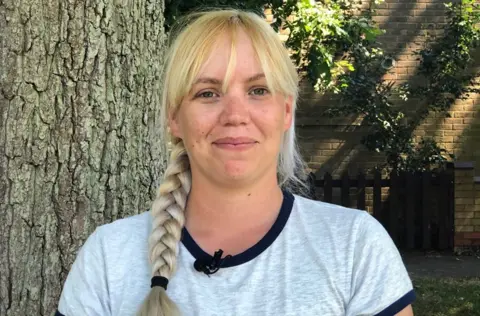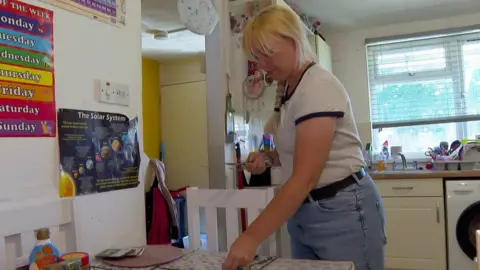Cost of living: Families who care for relatives' children in crisis
 BBC
BBCPeople who take in relatives' children to keep them out of the care system, fear having to give them up as living costs soar, says the charity Kinship.
In England and Wales, most kinship carers get less financial support than foster carers and some have warned they are now struggling, says the charity.
Ministers say they are working to identify how best to improve support.
But rising prices mean Laura Thornton, who cares for two half-siblings, gets "threatening letters" about her debts.
Laura is among almost 1,500 kinship carers in England and Wales who responded to the charity's survey. Between them they look after more than 2,000 children. But the survey suggested:
- Almost nine in 10 struggled to make ends meet, highlighting problems with rising heating bills, the cost of food, children's clothes, and rent or mortgage payments
- Just under a third feared severe financial strain could prevent them continuing to care for their children
Laura, 33, from West Sussex, took in her two half-siblings six years ago after a family bereavement. Until then, she'd worked 60 hours a week as a trainee team leader in hospitality.
If she hadn't stepped in, she says, it's highly likely the children would have been taken into care and split up: "I felt I needed to keep my siblings together. They would have felt neglected and unwanted."
Rising bills
Early in her application for legal guardianship, social services told Laura she would have to give up work and devote her time entirely to the children, so she now depends on benefits.
"It's been life-changing, but I wouldn't have it any other way. I've survived on food banks, school food vouchers and family help. I don't have any spare money - it all goes on gas and electricity bills which have gone up from £91 to £200 per month," she says.
"The pressure is very, very high. I don't want to fail as a parent and I feel like if I'm not able to pay my bills, I'm going to become a failure."
She says a regular financial allowance - the same as a foster carer is paid - would make "a huge difference".

Last month, an independent review of England's council-run children's care services urged changes, including better financial and emotional support for families like Laura's.
Kinship wants family members who care for relatives' children to receive a universal, standard, non-means-tested allowance in line with the minimum amounts paid to foster carers in England and Wales, which vary from £137 to £240 a week, according to location and the children's age.
The financial support currently offered is "inadequate and patchy", says the charity.
"Pushed into poverty, the financial strain means many kinship families are worried they may have to give up the care of the children," says Kinship chief executive Dr Lucy Peake. "This would be a massive tragedy that is entirely preventable."
A spokesperson for England's Department for Education said: "Kinship carers often make sacrifices to give vulnerable children and young people permanent, loving homes.
"Local authorities can offer discretionary financial support to kinship carers and, later this year, government will respond in full to recommendations suggested by the independent care review, including how we can support kinship carers further.
"In recognition of rising costs, the government is also providing over £37bn to help families, targeted to support the most vulnerable."
A Welsh government spokesperson said: "We greatly value the care and support that foster and kinship carers provide. We are currently undertaking a review of support available to them in Wales.
"Any kinship carers that are experiencing difficulties or require advice and guidance should approach their local authorities directly to discuss and establish what advice and support they can access."

Have you been affected by the issues raised in this story? Please share your experiences by emailing [email protected].
Please include a contact number if you are willing to speak to a BBC journalist. You can also get in touch in the following ways:
- WhatsApp: +44 7756 165803
- Tweet: @BBC_HaveYourSay
- Upload pictures or video
- Please read our terms & conditions and privacy policy
If you are reading this page and can't see the form you will need to visit the mobile version of the BBC website to submit your question or comment or you can email us at [email protected]. Please include your name, age and location with any submission.
